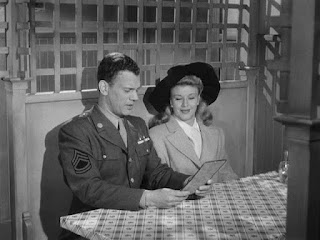Directed by William Dieterle; produced by Dore Schary
Zach Morgan (Joseph Cotten) is a U.S. Army sergeant given leave from his hospital for the Yuletide. He had been bayoneted, but his wounds go beyond the body: he is suffering psychological trauma from his experiences; recovering from them, he hopes. Mary Marshall (Ginger Rogers) has been granted a ten-day pass from prison, where she is serving a six-year term for involuntary manslaughter. When they meet, they share an immediate affinity, but neither wants the other to know from what they have just come. As their relationship deepens, it becomes more and more difficult to keep their secrets, yet they feel they must, even so.
Cinematic romances are the rockiest in all the universe. After all, if it were not for the difficulties an otherwise happy couple encounters, there would be no drama - or comedy - and no movie. Often, the barriers to a smooth relationship are contrived, though this does not mean they are unconvincing. In I’ll Be Seeing You, only half the tribulations are contrived: after all, the number of convicted female felons on parole from their prisons in the early 1940s must have been limited, especially at Christmas-time. The number of shell-shocked soldiers was, unfortunately, rather greater. Nonetheless, the two leads, the writing and the direction pull off a winning, if not noteworthy, production.
Cotten does an excellent job of making his character realistic, and making his affliction realistic. One wonders if the studio was hesitant to portray a soldier with psychological problems. If so, Cotten’s down-to-earth, likeable yet strong personality probably reassured everyone. Certainly, he portrays Zach Morgan entirely sympathetically.
Rogers does just as well in her role. There is a moment when Mary is trying to explain to her aunt (Spring Byington) that she can’t rely on having even the ordinary dreams that most women have, dreams - such as marriage, a small house, children - the realisation of which is perfectly feasible. Her aunt understands to an extent, but Mary’s attempts to convey her feelings trail off, as if she knows it’s easier, and less hurtful, just to nod and agree. Her life, as she sees it, will be one of just getting by.
The other actors are very good, too. Other reviewers have mentioned that Shirley Temple, as Mary’s cousin, Barbara, is annoyingly immature one moment and insightfully intelligent beyond her years the next. Well, Barbara is seventeen. She’s trying to be a woman but isn’t there yet, so her efforts are self-conscious (she describes the low neckline of her new dress as a ‘morale-builder’) and only intermittently successful.
Byington (to whom Temple’s resemblance adds verisimilitude to their movie relationship) and Tom Tully, as Mary’s aunt and uncle, are neither the wise elders nor the bland cardboard cut-outs viewers might expect. They are supportive of Mary, a little awkward in an unfamiliar situation, but probably more typical of people of their era and class than many other characters. They are also lively, enjoying a fun evening out, younger than their ages.
The writing is of two halves. The romance is fairly routine for movies: two people meeting by chance and falling in love over a very short time, despite not knowing a great deal about each other. But in dealing with their respective problems, the script is very good, especially in Morgan’s case.
There is an instance when he and Mary are watching a war-movie. Morgan’s reaction is one that combines embarrassment, disappointment and physical discomfort (note the perspiration he sweats.) Interestingly, he doesn’t condemn the film (perhaps the studio making I’ll Be Seeing You had made a few war movies itself) but explains that it isn’t how soldiers view a war. And Morgan’s later panic-attack later must have been written by somebody who had experienced one.
There is also an attack by a vicious dog which, though neither man nor best are hurt, must have conjured up for Morgan memories of hand-to-hand combat. Though nothing is said of a comparison, Cotten’s face made such a statement unnecessary.
It is hard to separate the work of writing, directing and acting in these moments, but the last two in particular raise I’ll Be Seeing You above the average. And one wonders if it did a favour to thousands of battle veterans who at last had a graphic example of what they were going through, and whose loved ones felt that they could broach the subject, after observing it handled so well and sympathetically. If I’ll Be Seeing You was not the first movie to show such things - and to show understanding to an almost exclusively female dilemma in Mary’s crime - it must been a very early example.










And one wonders if it did a favour to thousands of battle veterans who at last had a graphic example of what they were going through, and whose loved ones felt that they could broach the subject, after observing it handled so well and sympathetically."
ReplyDeleteThe movie was a big hit, I believe. Perhaps your comment explains why.
We know so much more now about PTSD, but it was personal and often private struggle for so many then. I had two uncles who fought in the WWII. Neither spoke of their time there - it was if it was buried and forgotten. Though I suspect it was never truly forgotten.
ReplyDeleteGreat blog
ReplyDelete